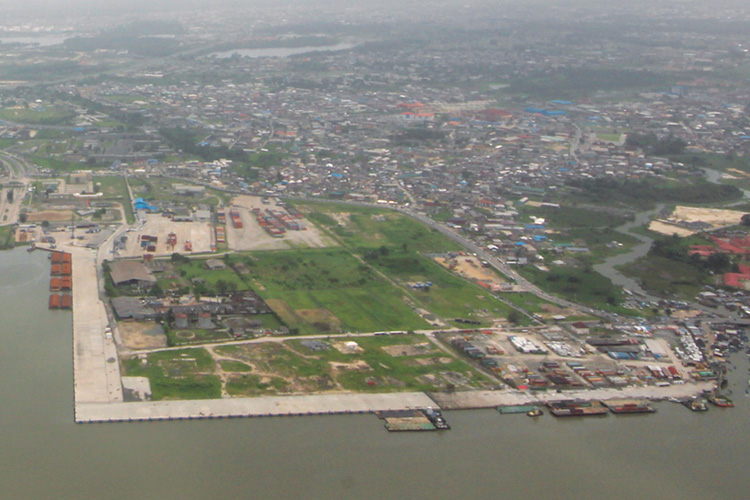
Amidst the dwindling fortunes of Nigerian ports, manifesting in drop in ship and cargo traffic, Nigerian authorities are pushing for development of new seaports. Modern trends in shipping favour the development of deep seaports and the acquisition of bigger ships all of which make for economy of scale. Indeed, a deep seaport has the major benefit of handling larger vessels, thereby reducing freight costs and stimulating economic activities.
The world over, attention has also shifted to building deep seaports, which are capable of receiving ultra large vessels with the attendant advantage of economy of scale. Ship owners and shipping lines are increasingly shifting to acquiring these types of vessels, which can only go to deep seaports, with the benefit of maximizing trade and profits.
Commendably, Nigeria is keying into this modern trend, and is moving in this direction with its move towards the development of deep seaports. However, this does not explain the reason for encouraging the proliferation of seaports.
In various parts of the world, seaports are catalysts for development, having the potential of bringing significant population around it and setting the pace for a new city. For this reason, the location of a new port is carefully and deliberately chosen.
Nigeria already has six major ports, some of them almost moribund. The ports are bogged down by infrastructure decays and unfavourable trade practices and policies. Efforts to dredge the port in Calabar, which records have revealed is wrongly located as a result of which access to the port has remained an intractable problem, had always ended up as an exercise in futility, with huge amounts of money flowing into private pockets. Burutu, Koko and Sapele ports are almost dead. And it is only recently that life is coming back to Delta Ports, Warri.
Warri has two main facilities – old Warri Port and new Warri Port. The old Warri Port, which has just been refurbished and equipped is now being managed and run by Ocean & Cargo Services Limited which took it over in February this year, while the new Warri Port has been under the control of INTELS and Julius Berger. With these two port terminals still struggling for patronage, since all shipping activities are concentrated in Lagos ports, stakeholders were taken aback when the Federal Government recently announced that a new port would be built in Warri. According to the Minister of Transportation, Rotimi Amaechi, the Federal Government has approved the construction of a new seaport in Warri at the cost of $3.9 billion.
“We are building a new seaport in Warri; the cabinet approved it last week, that is about 3.9 billion dollars,” he told newsmen in Abuja. The statement was very terse and did not give details of the approval or the rationale for the new port. But since the cost of building the port was given, and approval already given by the cabinet, the Minister’s statement cannot be dismissed as lacking in substance or a mere statement of intent. What is worrisome to maritime stakeholders, however, is that there are existing port facilities in Warri that remain under-utilized.
The Minister also disclosed that the new Abuja-Itakpe, Itakpe-Warri railway line will link the proposed port. The rail line, he said, has also received the approval of President Muhammadu Buhari. This is quite welcome. But the questions stakeholders are asking are: why a new port in Warri? Where will the port be sited? Is there anything stopping the new rail line to Warri from linking the existing Warri port? Suppose a new port is built in Warri and appropriately linked by rail, what happens to the old Warri port that has just been refurbished, equipped and concessioned?
Nigeria is already building three new deep seaports. Two of these ports are located in Lagos – at the Lekki Free Trade Zone and Badagry. The third, the Ibom deep seaport is located in Akwa Ibom State, South South Nigeria. All these ports are being constructed to take the pressure off the Lagos and free the severely dilapidated access roads. They are also expected to help Nigeria maximize the benefits of shipping and import business. The Lekki and Badagry deep seaports are being built through a public-private partnership. The Ibom seaport, which is being championed by the Akwa Ibom State Government, is also being built with private sector inputs. It therefore beats the imagination why government is embarking on the construction of a new seaport with public funds, instead of channeling the whopping $3.9 billion it has earmarked for the construction of a new port in Warri towards making the existing ones functional.
The appropriation of this enormous sum of money out of the blues for the construction of a new port in Warri demands some explanation. Even if it is a loan, it is still being contracted on behalf of Nigerians and the future generation that is already steeped in the mire of increasing debt burden.
The country’s economic planners should not lose sight of current trends in global shipping. The proliferation of ports that may be starved of patronage in future and eventually become under-utilized like the existing ones is not the way to go. This is more so when experts and industry observers are questioning the economic viability of some of the proposed ports in view of the current economic realities confronting Nigeria.
Copyright Ships & Ports Ltd. Permission to use quotations from this article is granted subject to appropriate credit given to www.shipsandports.com.ng as the source.
